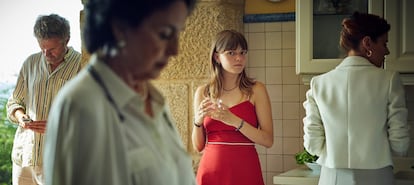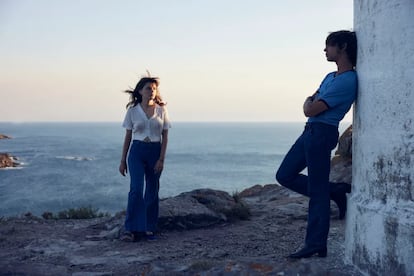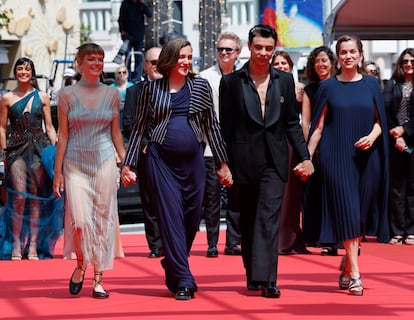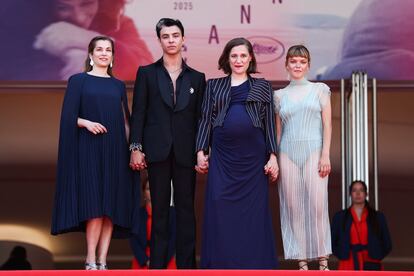By car, on a six -hour journey, with his boy and his midwife. This is how Carla Simón (Barcelona, 38 years old) has arrived physically) to Cannes. However, the cinematographic and vital path, which in their case are intricated to the heart, has been much longer. Its first three films, to which the short Letter to my mother for my son (2022), are an intimate and fictional trip to their own existence. Yes in Summer 1993 He showed a seven -year -old girl who was orphaned and was going to live with her uncles (like Simon), and in Alcarràs He counted what the decline of fruit and vegetable agriculture in the Segrià region was (way of life to which his maternal family has dedicated himself), now in Pilgrimage It is time to turn to their parent, from Galician roots, and delve into the months that their parents lived in Vigo, in the middle of the explosion of addiction and death that formed heroine and AIDS. The protagonist is not Carla Simón, although she could. His cousin is not his cousin, but the feelings accumulated for years in the director germinate on the screen.
Con Summer 1993 (2017) gave a powerful punch at the Spanish cinema table, and won the Best Berlinale and Goya Prima Opera Prize for Best Novel direction. With Alcarràs (2022) achieved the Golden Bear of the Berlinale. In that ascent towards glory he continues with Pilgrimage, which participates on Wednesday in the competition of the Cannes Festival before its premiere in Spanish Salas on September 5.
Ask. In his first pregnancy he won the Golden Bear. He arrives in Cannes of eight months. A Gordo Award for Son?
Answer. (laughs) The truth is that at the same time I thought and did not think about when to have this girl. Now it is getting hard to me so much effort. I only think about next week, that I will be at home resting.
P. Are you living a rehabilitation process of the past while creating the future?
R. Pilgrimage was designed before Alcarràs, And when I finished this I raised if the biographical journey arrived there. But I was aware that it was not fair. It was a trilogy. The premieres and awards coinciding with pregnancies … It has given itself. It’s strange, and strong, right? It can also be the definitive closing signal of the cycle. I can already say that my family cycle is closed, and now it touches other things. To the lives of others.
P. ¿Segura?
R. Yes, because after Alcarràs I hesitated. I suffered at the same time the desire to face other issues, that craving was already in my present, and again, go back … do you know what convinced me? That is not only my story, but that of an entire generation.
P. There is also a growth as director, there is a different narrative in Pilgrimage.
R. When I sat after Summer 1993 With my producer, María Zamora, I put the two stories on the table. Alcarràs It was a challenge for its shared orality, although I thought at that time that it would be easier. Then the pandemic arrived, the creative process slowed down. That Pilgrimage Be the last one opened the doors to face something more daring. Today there are many more things that I want to try. It is time to advance.
P. He has always said that he felt Fast, quickly, From Carlos Saura, he spoke directly to you. And in Pilgrimage That influence is felt.
R. It is that this movie explained many things about my life. I think my protagonists and the couple of Fast, quickly They look like they are very peculiar and at the same time sexy. They have something magical.
P. Do you worry that people understand that it is their history but that at the same time it is not you?
R. The story is surface. It is normal for people to identify him with me because they already know my story. But I did not make the trip to Vigo in this way or with that age, the family structure is different … At this point I have already learned to knead my story. Because Pilgrimage It is born from the frustration of not knowing much about my parents. I understood that I had to invent for the narration to work.

P. Do you now understand your parents better?
R. I think I already understood them. What I have won is a perspective about them. I no longer judge them, but neither do your experience. I had to find the fair tone, which seemed very difficult for me. With the team we talk a lot about the importance of how we would portray them. At the same time I discovered more things about them in the writing of the script, because I always do a search work. I spoke even with their friends. I went to several therapies, as a very interesting transgenerational memory. They explained how the stories of your past affect who you are. I was also with a dream therapist. Is that I, when I sleep, dream a lot. There was a whole dimension of being able to connect with them beyond what they told me that it helped me.
P. And what does your family think of this very long trip?
R. For me, the important thing was to portray the pain of this family, which is, in turn, the pain of many already. From respect, because I met them later – I mean my paternal Galician family; I think there was also something there to digest that story on his part. Now I want you to see her. I have told that pain not judging them, but from the empathy of the difficulty of accepting a death in the circumstances that at that time, the end of the eighties, the early nineties, were unacceptable by the values in which the conservative Catholics lived.

P. The drug swept a generation.
R. There was an obvious innocence in them, born of not knowing the consequences of drugs. And to this a certain look was added to the other side of some classes: the surveillance of this pandemic was not greatly cared for, because while they were with drugs they did not get into politics. It was a generation that lived a need to experience in freedom. Now we have an awareness of how drugs are; They wanted to try things. They came from a very dark place and thought that was freedom. Spain was the European country with more deaths caused by heroin in those years. And in Galicia it was even worse, because it was the port of drug trafficking. I wondered people on research trips and distribution search, and everyone knew someone who died at that time.
P. In its previous two longs, the field ended up feeling claustrophobic for its characters. Here the sea seems the opposite, it provides a sense of freedom. With the ship they flee from the problems.
R. My father liked to navigate. And Vigo and the sea are inseparable. I have photos of the two sailing. My parents’ love story is linked to the sea. At the same time, after two rural films I wanted to approach another landscape, which for me has something mystical, to step on where my parents passed. Of course, I was frustrated not to know the spaces they inhabited during their love story. Because I never achieved that information and, in addition, because the city has changed a lot. I have that feeling of vacuum.
I have achieved a little less fear of making mistakes. I am already aware that there will be things that could go better and others that I do not know how to do, and that feeling has led me to enjoy more with Pilgrimage that with the previous films “
P. You always believe from some fragility. Have you felt safer directing?
R. I don’t know. I have enjoyed it more, that’s true. I question things a lot, I believe from doubt. I think: ‘This may be better, right?’ But it is true that having a solid team, which we know for a long time, drives me. And since you are there, why not try something new? I have achieved a little less fear of making mistakes. I am already aware that there will be things that could go better and others that I do not know how to do, and that feeling has led me to enjoy more with Pilgrimage than with the previous films.


